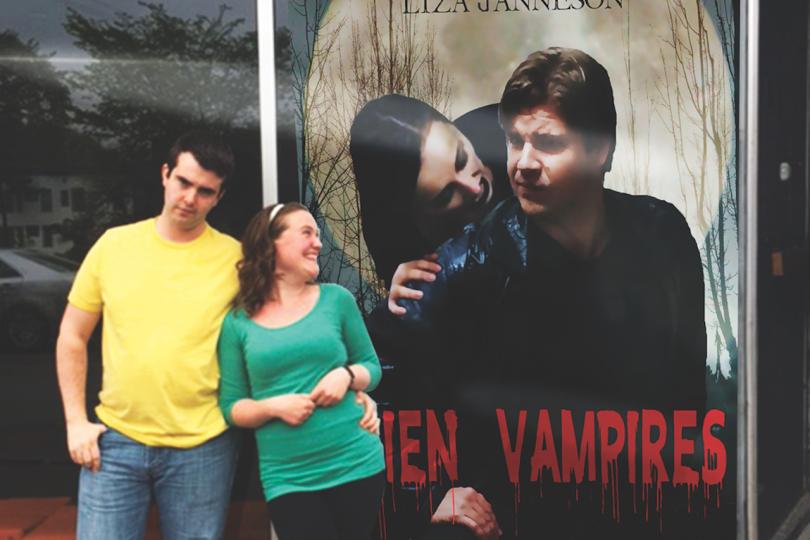Day 7: Roles of Celebrity

The supposed outsider nature of Fringe would suggest it’s the type of event where weary art lovers can buy themselves a few blessed hours away from the pop-culture garbagescape that elevated a discolored sack of reality-TV tics and ejaculations to the near-pinnacle of our fragile political ecosystem. But nah, Fringe is just as susceptible to celebrity worship as anyplace else. (Hell, the aforementioned sack is a title character in no less than three of this year’s productions.)
I’m always intrigued by how the multi-voiced monster of Fringe handles the same topic from varying perspectives. In previous years I’ve taken one-night samplings of shows dealing with horror and space travel. For 2016, I thought I’d see how we’re talking about celebrity.
Celebrity as salvation
I’ve heard the story of the pious kid growing up in a devoutly Christian household in the ‘80s or ‘90s who starts to question his convictions when faced with his hormonal imperatives told a dozens of times by as many tellers, myself included. This isn’t new territory for anyone who’s frequented Moth-style literary events, but it’s the type of material that can still be entertaining as heck in the hands of someone with sharp wit and a strong voice, and in The Gospel of Sherilyn Fenn creator Brad Lawrence has both. Lawrence’s rapid-fire delivery (there are a few moments when his patter flows so quickly that it borders on unintelligible) and endearingly anxious stage presence animate the familiar arc and bring the details roaring to life.
Celebrity doesn’t play as big a part as I’d expected in this Gospel, but it colors the edges and inspires any number of profound life changes. Lawrence opens with the story of how his early artistic prowess turned into an unexpected cottage industry sketching hand-drawn porn for middle school classmates at two bucks a pop. Anyone who’s yearned for adulation can relate to his elation at being, for the first time, something more than the awkward fat kid with Coke-bottle glasses. Later on, surreptitious Showtime viewings of actress Sherilyn Fenn’s skin-baring work in Two Moon Junction inspires him to undertake an extreme weight loss program, on the grounds that a robust physique might be enough to land a guy like Lawrence a Sherilyn Fenn of his own. It’s a jaunty, relatable trip through a pre-internet adolescence, with every sexual awakening topped off by dollops of evangelical guilt.
Celebrity as poison
In Notorious PKG’s Sons of Swayze celebrity fuels just about every event. Set several years after the death of oddly iconic leading man Patrick Swayze, Peter Gilbert’s play deals with the discovery of the actor’s secret will. Swayze’s fame-loving widow suddenly finds herself pitted against her late husband’s sons via previously unknown backstage dalliances: a scam-artist running a meditation studio, a squeaky-clean elementary school teacher, and a mysterious third party. Each scion quickly learns that coming into cash is one thing, but inheriting second-hand celebrity is quite another.
While there are a lot of interesting ideas about hero-worship and cultural identity at play in Sons of Swayze, they’re executed with an unfortunate lack of grace. This is primarily a dark comedy, with the jokes ranging between awkward movie references, clunky wordplay and ugly caricatures. No one here is especially likable or interesting, with the character of Swayze’s real-life wife Lisa Niemi treated especially ungenerously. (It didn’t help that Tuesday’s performance included a flurry of flubbed lines and missed cues by multiple actors.) Sons of Swayze is at its best when exploring the newfound heirs’ respective swells in self-esteem and entitlement, but those moments are all too brief. Handled as an over-the-top skewering of our lionization of celebrities, this all might have worked. As it stands, it’s simultaneously too timid and too mean to gel.
Celebrity as aphrodisiac
Celebrity is equal parts playful fantasy and grim reality in the world of Giant Giraffe’s Celebrity Exception, one of the flat-out funniest narrative plays I’ve ever seen in Fringe. The title refers to that staple of barroom chatter and sitcom plots wherein a couple allows each other a free pass to have sex with a favorite celebrity should the situation ever present itself. Here the celebrity in question is Xander Lucas (Daniel Flohr), a baby-faced star of horrible action movies who hits all the right buttons for Minneapolis party planner Kayla (Lizzy Shea). Her boyfriend Mark (Corey DiNardo), on the other hand, is endlessly annoyed by both Xander and the celebrity exception concept. When Xander unexpectedly shows up at a local Caribou while filming Machine-Gun Ninja, the purely theoretical suddenly becomes all-too possible.
Celebrity Exception wrings a striking amount of heart and hilarity out of its solid, if somewhat familiar, relationship comedy plot. A lot of that credit is due to a hugely appealing cast. All three leads, plus Emily Rose Duea as Mark’s combative/supportive sister, nail their parts, creating realistic, relatable human beings rather than sitcom cliches. The biggest winner, though, is Katherine Glover’s boisterous and nuanced script, which dissects celebrity from multiple angles without missing a comic beat. The literal star-fucking at the heart of the play is certainly not without consequences, but the fallout never lands exactly where - or on whom - we’re trained to expect.
Celebrity as fascination
Regular Minnesota Playlist readers know Derek Lee Miller as the author of the News & Notes column, arguably the most consistently excellent weekly arts writing in the Twin Cities (and I honestly think I say that without untoward bias). It’s hard to think of a better vehicle for Miller’s combined gifts of pithy observation, illuminating research, and polysyllabic wordcraft than Know Your B-Movie Actors. Each Fringe production finds Miller elaborating on the lives of lesser-known legends from Hollywood’s past, with an assist from a special guest actor/bartender.
Tuesday’s theme was “bad guys,” with Savage Umbrella’s Allison Witham wearing a wry smirk and a variety of costumes behind the bar. The evening’s profiles, Jack Elam, Rondo Hatton and Richard Kiel, share a common trait of being dudes who rose to the heights of villainy by being really weird-looking. Miller digs into the backstories of each actor with wit and warmth, illuminating not just their movie careers but also the odd circumstances that led them to the screen: Elam was a Hollywood accountant whose impending blindness forced him in front of the camera, Hatton was a good-looking all-American boy whose face and body were deformed by adult-onset acromegaly, and Kiel was a 7’2” giant affected by a different form of acromegaly. As a trash-film buff myself, I knew all of these stories going in, but hearing them related in Miller’s masterful phrasing adds several layers of hilarity and poignancy. It’s a laid-back but passionate presentation that captures the bittersweet success stories of three men who, almost against their wills, achieved the celebrity status coveted by so many Americans. It’s about as much fun as an hour of life’s cruel ironies could be.




